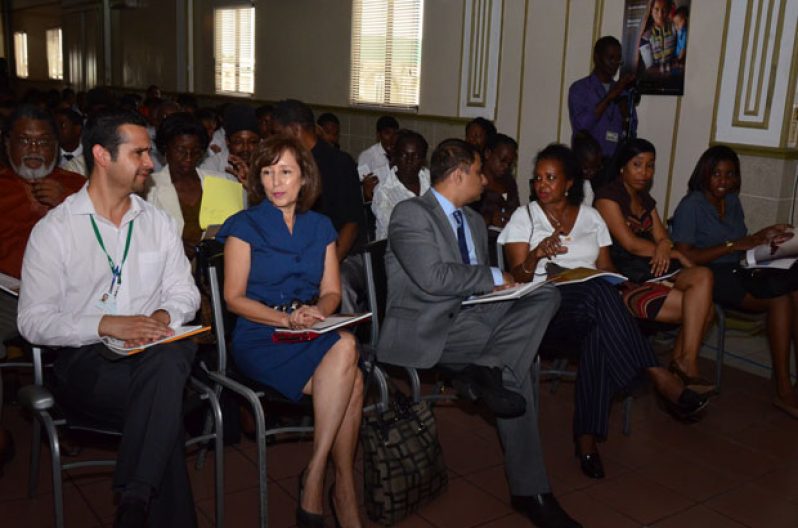THE United Nations Population Fund (UNFPA) released its annual report on Wednesday with prominent focus on teenage pregnancies and the challenges they pose to society.

The occasion, at Regency Suites Hotel, in Hadfield Street, Georgetown, was attended by representatives of other development agencies and non-governmental organisations (NGOs) assisting teenage mothers, as well as students from three secondary schools, Central High, St. Stanislaus College and Brickdam.

The audience was addressed by Ms. Patrice La Fleur, Assistant Representative UNFPA Sub-Regional Office for the Caribbean in Guyana, Minister of Health, Dr. Bheri Ramsaran as well as two teenage mothers, Indira Austin and Tiffany Hunt.
La Fleur mentioned that teenage pregnancies are, often, a result of cultural, social and economic circumstances, as most girls who become pregnant are from marginalised communities.
She said those girls, usually, have little control over their personal circumstances as adults often take decisions that affect them. As a result they have low self-esteem and are easily manipulated by others.

Consequently, La Fleur emphasised the importance of embarking on a new approach that will empower girls through education.
Less likely
She noted that the girls who stay in school longer are less likely to get pregnant and added that “childhood must never be derailed by motherhood.”

Following La Fleur’s remarks, Austin, a teenage mother told the gathering how she fell pregnant at the age of 14, due to a lack of proper and guidance information.
After her pregnancy, her family and boyfriend encouraged her to abort the foetus and, when she refused, she was treated like an outcast and none of them wanted anything to do with her.
She said she got a second chance in life when a hospital referred her to Women Across Differences (WAD), an NGO supported by UNFPA. According to her, WAD encouraged and supported her and today she is a confident young woman, boasting skills she never had.
She declared confidently:“This is not the end for me, but the beginning.”

The next speaker was the other teenage mother, Hunt, who already had two children at the age of 17. She related that she had no support from the children’s father and had to work two jobs just to make ends meet.
She, too, was referred to WAD and said she would, probably, have given birth to five or more children if it was not for the help she received from that organisation.
She, just like Austin, mentioned the love, support and encouragement she received and today is a confident married woman boasting many skills she did not have previously.

She has attended UNFPA conferences in Mexico and The Dominican Republic and is scheduled to graduate from the University of Guyana (UG) in 2016.
Hunt encouraged other girls not to engage in early sexual intercourse and to resist pressure from boys who tell them they must in order to prove their love.
Minister Ramsaran declared that teenage pregnancy is not a health issue but, rather a developmental one.
Like La Fleur he maintained that education, particularly on reproductive health is the solution to the problem of adolescent motherhood. He called for greater collaboration between the Ministries of Health and Education as well as the Parent Teachers Associations (PTAs) to tackle it.
Better mother
According to Ramsaran “an educated woman is a better mother.”
He stated that, when education is disrupted, it begins a vicious cycle that negatively affects not only the future of the mother, because she can no longer continue the process but also the future of her offsprings.
Ramsaran recognised UNFPA, in particular La Fleur as well as WAD for the stellar work they are doing. He called on the media to spread the message far and wide, so that people everywhere can learn about what WAD is doing, so that its teenage mothers programme can be replicated countrywide.
He also urged those students present to learn from Austin and Hunt and not fall into the same situations.
(By Jimmy Roos)



.jpg)








